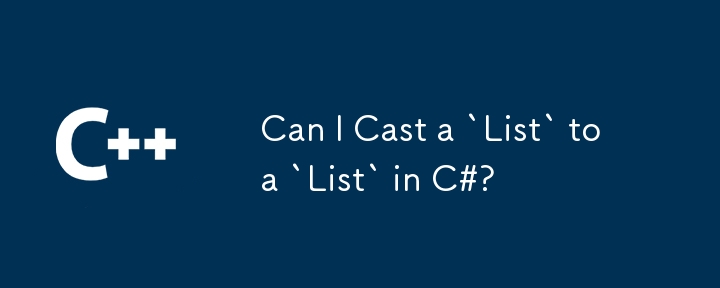

Convert derived class list to base class list
Covariance means that a derived type can replace its base type without losing any functionality. In this case, we have a base class (Animal) and a derived class (Cat), where the base class contains a virtual method Play that accepts a List as input parameter.
The following code demonstrates the conversion problem:
<code class="language-csharp">using System;
using System.Collections.Generic;
using System.Linq;
using System.Text;
namespace ConsoleApplication9
{
class Animal
{
public virtual void Play(List<Animal> animals) { }
}
class Cat : Animal
{
public override void Play(List<Animal> animals)
{
}
}
class Program
{
static void Main(string[] args)
{
Cat cat = new Cat();
cat.Play(new List<Cat>());
}
}
}</code>Compiling the code will result in the error: Argument 1: cannot convert from 'System.Collections.Generic.List
This error occurs because List is a writable data structure. If we allow conversion from List
To solve this problem, C# 4 introduced a concept called "generic covariance" for known-safe interfaces. IEnumerable
We can solve the conversion problem by modifying the Play method to accept an IEnumerable
<code class="language-csharp">class Animal
{
public virtual void Play(IEnumerable<Animal> animals) { }
}
class Cat : Animal
{
public override void Play(IEnumerable<Animal> animals) { }
}
class Program
{
static void Main()
{
Cat cat = new Cat();
cat.Play(new List<Cat>());
}
}</code>By using the IEnumerable<T> interface instead of List<T>, we take advantage of the covariance feature of C#, avoid type conversion errors, and ensure the safety of the code. IEnumerable<T> only allows data to be read, not modified, so it is safe to convert List<Cat> to IEnumerable<Animal>.
The above is the detailed content of Can I Cast a `List` to a `List` in C#?. For more information, please follow other related articles on the PHP Chinese website!




